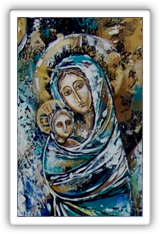|
|
Comprehending Medjugorje : Original Documents And Conversations with Arnaud Dumouch
The main difficulties
Reference (French Edition) :
Daria Klanac, Comprendre Medjugorje : Regard historique et théologique, avec la collaboration du théologien Arnaud Dumouch, Informativni centar Mir, Medjugorje, en coédition avec les Éditions Sakramento, Paris, 2012, 2e éd. (1re éd. 2008, ISBN 978-2-915380-19-4 & 978-9958-36017-6), entretien avec le théologien Arnaud Dumouch, pages 145 à 147.
English Translation by Duško Čondić
The main difficulties
Daria Klanac : As regards the response of the Virgin in connection with religions, and according to the sources that I have cited in my previous book,[24] how do you see that difficulty?
Arnaud Dumouch : The sentence: “All religions are the same before God,” can be explained in two fashions:
1. The first explanation: (a false one): Beliefs have value in and of themselves; all religions are of equal worth. This would be erroneous. Even Pope Benedict XVI recently warned when he said that only the Faith of Christ grants at the same time the purpose of a blessed vision that is achieved through love (and humility), and the means of salvation (the sacraments, teaching, form of one’s life).
2. The second explanation: (a correct one): In the eyes of God, all religions endeavor, sooner or later, to lead to Christ and to His act of salvation. In that sense, they are equal before the eyes of God. This explanation is true, since we must believe, as expressed by Vatican II: “Inasmuch as Christ has died for all, and that the ultimate human purpose is actually the same, namely, Divine, we must believe that the Holy Spirit extends, in a manner known only to God, the possibility that they associate themselves to the mystery of the Resurrection.”[25] Jesus announces this in His Gospel: (John 10:16): “I have other sheep tat are not of this fold. Them also I must bring, and they shall hear my voice, and there shall be one fold and one shepherd.” In other words, at the moment of death—the eleventh hour of this life, the Master of the harvest call everyone without exception into his vineyard such that only he who of his own free will rejects that call will be lost.
3. The third explanation (a correct one): Every person, regardless of his Faith,[26] is equally and infinitely loved by God. This is obvious. God is simplicity and loves all. In His very being, He is that Love.
D. Klanac : I verified the translation of that problematic message:[27] “All Faiths are the same before God.” In the parish chronicles dated the 1st of October, 1981, three questions and answers do, in fact, exist:
1. Are all faiths good? All faiths are the same before God. God rules over them as the Ruler in His own Kingdom.
2. Are all faiths the same? All the faiths in the world are not the same since men do not submit to the Commandments of God; rather, they reject them and defile them.
3. Are all the Churches the same? They are not. In some, God is prayed to more, in some, less. Much of this is dependent on the priest who organizes the prayers, as well as on the power or strength he has within himself.
A. Dumouch : Are these the direct responses of the Virgin? The language of those responses makes use of Croatian phrases that carry their own nuance and meaning within the framework of that language (“isti” [the same], “jednaki” [equal]). In any event, expressed in theological language as used by francophonic speakers, this is what it would mean: it can be said that religions are the same before God in two senses:
1. In its first sense, it can allude to that which relates to a judgement on the part of God: taken in that sense, we can then answer: “yes,” since God looks at all faiths with His singular Love which He Himself is.
2. In its second sense, it can allude to that which relates to religions themselves taken in and by itself: taken in that sense, we must answer: “no.” All religions are not equivalent inasmuch as some of them offer grace and salvation and also follow the Divine Commandments, while others do not. As regards individual Catholic Churches, which transmit the word of grace within themselves, all are not the same. All is dependent on the fervor of the faithful, and, therefore, of the pastor who leads them. Revelation already said as much when it differentiated the various graces of the seven first local Churches. (Cf. Rev. 1:4, etc). In sort, then, this interpretation of the Parish Chronicle as recorded on the 1st of October, 1981, in three distinctions, is worthy of Thomas Aquinas.
D. Klanac : To your thinking, do the words “iste” [the same], and “jednaki” [equal], have the same theological meaning?
A. Dumouch : Accordingly, it is possible that the word “iste” relates to God’s view of the matter (point 1 above), while the word “jednake” relates to religions taken by themselves alone, (point 2 above). In any case, taken in that sense, the theology contained in that text is, at the same time, consistent with the faith and the theology of the recent documents of Benedict XVI.
24. Medjugorje, réponses aux objections, p. 89. [↩]
25. Gaudium et Spes, No. 22.5, the official translation. [↩]
26. Mt 20:1-16. [↩]
